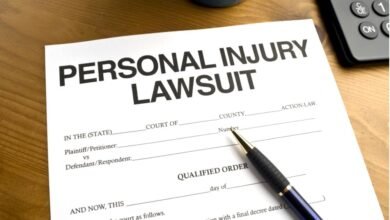Northern Ireland Assault Charges: Legal Defence Strategies and Penalties
In this comprehensive guide, we explore the legal framework surrounding assault charges in Northern Ireland and effective legal defense strategies.

Assault charges in Northern Ireland are serious legal matters that can have far-reaching consequences for those accused. Understanding the legal definitions, potential penalties, and available defense strategies is crucial for anyone facing such allegations.
Whether the charge involves common assault or a more serious form like aggravated assault or grievous bodily harm (GBH), the stakes are high. In this comprehensive guide, we explore the legal framework surrounding it in Northern Ireland, the implications for the accused, and effective legal defense strategies to navigate the criminal justice system.
What Constitutes Assault in Northern Ireland?
Under Northern Irish law, assault is broadly categorized into several levels of severity, each carrying distinct penalties. The term “assault” does not solely refer to physical violence but can also include threats and actions that cause a person to fear imminent harm. The main categories include:
- Common Assault – Involves minor injuries or threats of violence. No physical contact is necessary for a common assault charge.
- Actual Bodily Harm (ABH) – Occurs when the assault results in injuries that are more than transient or trifling, such as bruises or minor cuts.
- Grievous Bodily Harm (GBH) – Refers to serious physical injury. This is a more severe form of assault, often involving weapons or sustained attacks.
- Aggravated Assault – Includes assault with a specific intent, such as resisting arrest or targeting a protected class, such as public officials.
Legal Framework for Assault Charges in Northern Ireland
The legal framework governing assault charges in Northern Ireland is derived from a combination of common law and statutory provisions. The Offences Against the Person Act 1861 is the primary statute that outlines various forms of assault and corresponding penalties. Additionally, case law continues to shape how courts interpret and apply these statutes.
Penalties for Charges
The severity of the penalty depends on the nature and gravity of the offense:
- Common Assault – Can result in up to 6 months’ imprisonment or a fine up to £5,000 if tried summarily.
- ABH – Carries a maximum sentence of 5 years’ imprisonment.
- GBH – If charged under Section 18 (with intent), the maximum penalty is life imprisonment. Under Section 20 (without intent), the maximum penalty is 5 years.
- Aggravated Assault – Penalties vary but can include substantial custodial sentences, particularly if a weapon was used.
Impact on the Accused
Being charged with assault can have serious implications beyond legal penalties. A conviction can affect employment opportunities, housing applications, travel visas, and personal relationships. Moreover, the psychological toll on the accused and their families should not be underestimated.
Legal Defense Strategies for Assault Charges
Crafting a strong legal defense is essential when facing assault charges. The right strategy can lead to reduced charges, acquittal, or alternative sentencing. Key defense strategies include:
- Self-Defense
One of the most commonly used defenses, self-defense involves proving that the accused used reasonable force to protect themselves or others from imminent harm. - Lack of Intent
Prosecutors must prove intent in most assault cases. Demonstrating that the accused did not intend to cause harm can weaken the prosecution’s case. - Consent
In certain situations, such as sports or consensual fights, the injured party may have consented to the risk of harm. This can be a viable defense depending on the context. - Alibi
Providing evidence that the accused was elsewhere at the time of the alleged assault can be a strong defense, especially if supported by witnesses or surveillance footage. - Mistaken Identity
If the victim or witnesses mistakenly identified the accused, challenging the reliability of such identifications can be critical. - Insufficient Evidence
Assault charges must be proven beyond reasonable doubt. If the prosecution’s evidence is weak or inconsistent, the defense can argue for dismissal. - Mental Incapacity
If the accused was suffering from a mental illness or was otherwise incapable of forming intent, this can be used as a partial or complete defense.
Importance of Legal Representation
Given the complexity and seriousness of assault charges, securing experienced legal representation is essential. A skilled solicitor can:
- Scrutinize evidence for inconsistencies
- Cross-examine witnesses effectively
- Negotiate with prosecutors for reduced charges
- Present compelling arguments in court
Case Studies of Assault Charges in Northern Ireland
Case studies offer valuable insights into how assault charges are prosecuted and defended:
- Case Study 1: A man charged with ABH following a pub altercation successfully argued self-defense, resulting in acquittal.
- Case Study 2: A woman accused of common assault during a protest was convicted based on video evidence but received a conditional discharge due to mitigating circumstances.
- Case Study 3: In a GBH case involving a knife attack, the defense’s claim of mistaken identity led to a not-guilty verdict.
Alternative Sentencing and Rehabilitation
Courts in Northern Ireland sometimes offer alternative sentencing options aimed at rehabilitation, especially for first-time offenders:
- Community Service
- Probation Orders
- Anger Management Courses
- Restorative Justice Programs
These alternatives can be more constructive than imprisonment and can help reduce recidivism.
Assault Charges Involving Domestic Violence
Domestic assault is treated with heightened sensitivity and seriousness. There are specialized courts and procedures for handling such cases. Protective measures for victims, including restraining orders, are common. Defense in these cases often hinges on disproving claims or demonstrating that the assault was mutual or provoked.
Youth and Assault Charges
When minors are involved, the juvenile justice system prioritizes rehabilitation. However, young offenders can still face serious consequences, including detention. Legal strategies often involve demonstrating immaturity, peer pressure, or lack of intent.
Role of Evidence in Assault Cases
Evidence plays a pivotal role in assault prosecutions:
- Medical Reports – Confirm the extent of injuries.
- CCTV Footage – Can support or refute witness statements.
- Witness Testimonies – Key to establishing what occurred.
- Forensic Evidence – May include fingerprints, DNA, or weapon analysis.
How to Respond if Charged with Assault
If you are charged with assault in Northern Ireland, immediate steps include:
- Do not resist arrest or argue with law enforcement.
- Request legal counsel immediately.
- Avoid discussing the case with anyone other than your solicitor.
- Gather evidence that supports your version of events.
Preventive Measures and Public Awareness
Education and awareness campaigns can help reduce incidents of assault. Promoting conflict resolution skills, de-escalation techniques, and understanding legal consequences are vital components of prevention.
Conclusion
Facing assault charges in Northern Ireland is a serious matter that requires immediate and strategic legal action. Understanding the legal definitions, potential penalties, and viable defense strategies is the first step toward mounting a successful defense. Whether dealing with common assault or a more serious allegation like GBH, securing experienced legal representation and preparing a strong defense are essential to protect your rights and future.
If you or someone you know is facing assault charges, consulting a qualified solicitor should be your top priority. The legal landscape is complex, but with the right approach, it is possible to achieve a fair outcome and move forward with your life.


